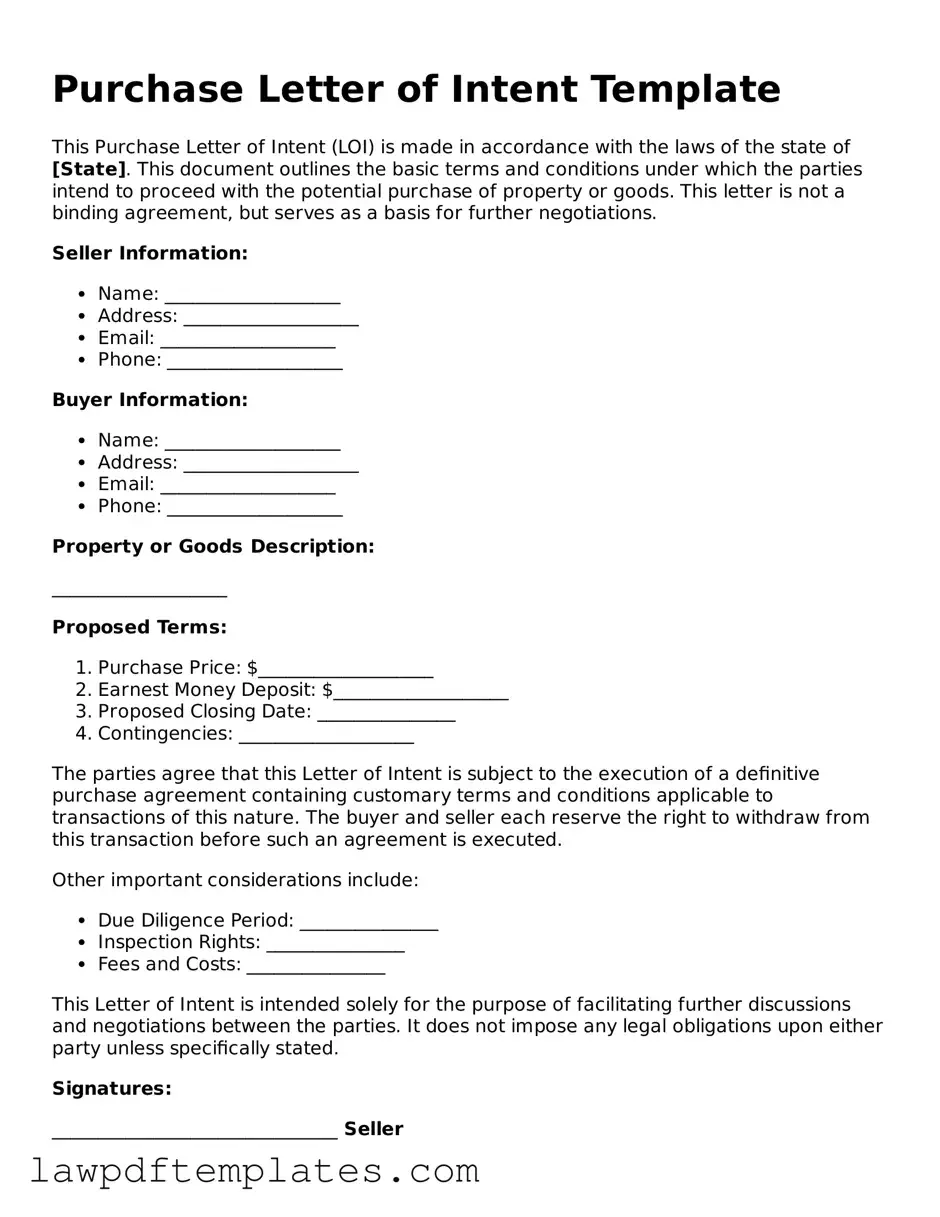Attorney-Approved Purchase Letter of Intent Document
Form Breakdown
| Fact Name | Description |
|---|---|
| Definition | A Purchase Letter of Intent (LOI) outlines the preliminary agreement between a buyer and seller regarding the purchase of property or assets. |
| Purpose | The LOI serves as a starting point for negotiations and indicates the buyer's serious interest in the transaction. |
| Non-Binding Nature | Typically, a Purchase LOI is non-binding, meaning that neither party is legally obligated to complete the transaction. |
| Key Components | Common elements include the purchase price, terms of payment, and any contingencies that must be met. |
| State-Specific Forms | Some states may have specific requirements or forms for LOIs, governed by local contract laws. |
| Confidentiality Clause | Many Purchase LOIs include a confidentiality clause to protect sensitive information shared during negotiations. |
| Expiration Date | LOIs often contain an expiration date, after which the terms may no longer be valid unless extended by mutual agreement. |
| Governing Law | The LOI may specify which state's laws will govern the agreement, impacting its interpretation and enforcement. |
Sample - Purchase Letter of Intent Form
Purchase Letter of Intent Template
This Purchase Letter of Intent (LOI) is made in accordance with the laws of the state of [State]. This document outlines the basic terms and conditions under which the parties intend to proceed with the potential purchase of property or goods. This letter is not a binding agreement, but serves as a basis for further negotiations.
Seller Information:
- Name: ___________________
- Address: ___________________
- Email: ___________________
- Phone: ___________________
Buyer Information:
- Name: ___________________
- Address: ___________________
- Email: ___________________
- Phone: ___________________
Property or Goods Description:
___________________
Proposed Terms:
- Purchase Price: $___________________
- Earnest Money Deposit: $___________________
- Proposed Closing Date: _______________
- Contingencies: ___________________
The parties agree that this Letter of Intent is subject to the execution of a definitive purchase agreement containing customary terms and conditions applicable to transactions of this nature. The buyer and seller each reserve the right to withdraw from this transaction before such an agreement is executed.
Other important considerations include:
- Due Diligence Period: _______________
- Inspection Rights: _______________
- Fees and Costs: _______________
This Letter of Intent is intended solely for the purpose of facilitating further discussions and negotiations between the parties. It does not impose any legal obligations upon either party unless specifically stated.
Signatures:
_______________________________ Seller
Date: ___________________
_______________________________ Buyer
Date: ___________________
End of Document
Common mistakes
Filling out a Purchase Letter of Intent form can be straightforward, but many people make common mistakes that can lead to complications. One frequent error is not including all necessary details about the property. Buyers should clearly specify the property address, legal description, and any relevant identification numbers. Omitting this information can create confusion and delay the process.
Another mistake is failing to define the terms of the offer. Buyers often neglect to include the proposed purchase price, financing terms, and any contingencies. Without these details, the seller may not understand the buyer's intentions, leading to misunderstandings or rejections.
People sometimes overlook the importance of including a timeline for the transaction. A lack of clear deadlines for contingencies, inspections, and closing can result in prolonged negotiations. Establishing a timeline helps both parties stay on track and ensures that the process moves forward smoothly.
Not addressing the earnest money deposit is another common error. Buyers should specify the amount of the deposit and the conditions under which it will be returned. Failing to clarify this can lead to disputes later on, especially if the deal falls through.
Buyers frequently forget to include their contact information. This oversight can hinder communication between the buyer and seller. It is essential to provide accurate phone numbers and email addresses to facilitate a smooth exchange of information.
Another mistake is neglecting to outline any additional terms or conditions. Buyers may assume that verbal agreements will suffice, but these should be documented in the letter. Clearly stating any conditions helps prevent miscommunication and ensures both parties are on the same page.
People often make the mistake of not reviewing the document thoroughly before submission. Typos or unclear language can lead to misunderstandings. Taking the time to proofread can help catch errors that might otherwise complicate negotiations.
Some buyers fail to consult with a professional before submitting the letter. While it may seem unnecessary, having an experienced real estate agent or attorney review the document can provide valuable insights and prevent costly mistakes.
Lastly, buyers sometimes forget to sign the Purchase Letter of Intent. A missing signature renders the document invalid. Ensuring that all required signatures are included is crucial for the letter to be considered official.
Consider Popular Types of Purchase Letter of Intent Documents
Sample Letter of Intent to Purchase - It often lists key terms such as purchase price and payment structure.
To assist parents in navigating the requirements, there are resources available to guide them through the process of submitting the necessary documents, including an easy-to-follow template from Legal PDF Documents, which can greatly simplify the task of preparing the Letter of Intent.
